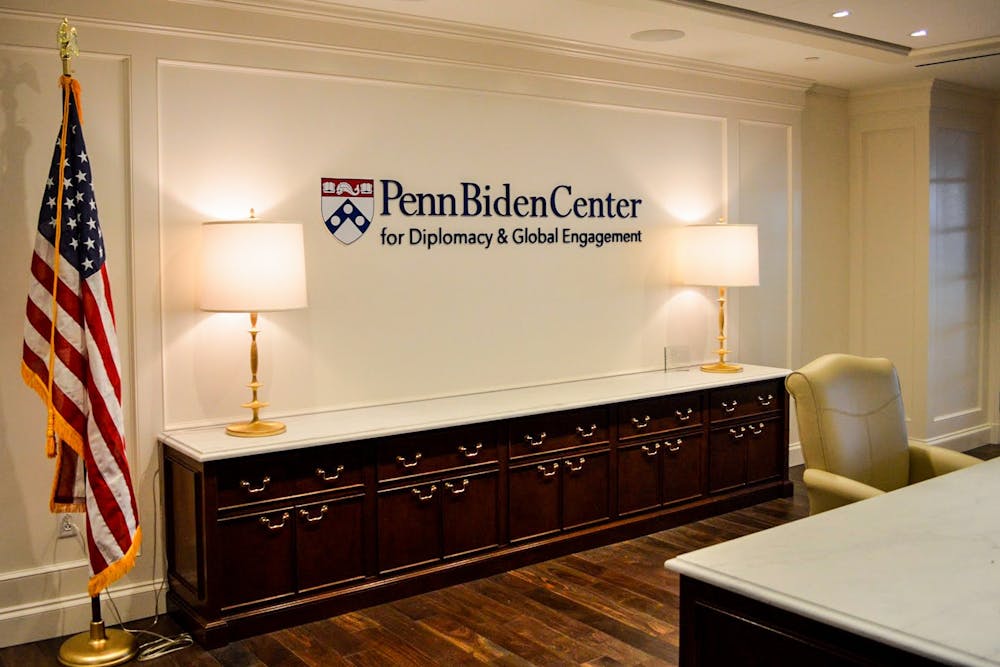
The Penn Biden Center for Diplomacy and Global Engagement, a University think tank located in Washington, D.C.
Credit: William SnowThe Department of Justice is reviewing classified documents that were found at Penn’s Biden Center for Diplomacy and Global Engagement, a University think tank based in Washington, D.C.
Attorney General Merrick Garland called into review around 10 documents from President Joe Biden’s term as vice president, CBS News reported Monday. The documents — which were found in Biden’s office in the center — were discovered on Nov. 2, 2022 by Biden’s personal attorneys before being turned into the National Archives and Records Administration, according to a statement from the White House.
Richard Sauber, who serves as Biden's special counsel, wrote to The Daily Pennsylvanian in a statement that the materials were found on Nov. 2, 2022, while preparing to "vacate office space" belonging to Biden in the center. The contents of the classified documents, as well as their level of classification, remain unknown —though CBS News reported that they are not nuclear secrets.
The classified materials consisted of documents on foreign countries, including on Ukraine, Iran, and the United Kingdom, though the majority of discovered items contained Biden family documents, CNN reported.
University spokesperson Ron Ozio referred the DP to the National Archives and the White House in response to a request for comment. The National Archives declined to comment, and the Penn Biden Center did not respond to an inquiry by the time of publication.
The Presidential Records Act requires federal officeholders to turn over legal documents as well as classified records at the end of their government service, according to CBS News. It is unclear why the records remained in a private facility after former President Barack Obama’s term.
Sauber wrote in his statement that "[the] President periodically used [the Penn Biden Center] from mid-2017 until the start of the 2020 campaign.”
He went on to write that the White House has cooperated with the National Archives and the Department of Justice since the documents were discovered. He added that the documents were found by the president’s attorneys, and that they have cooperated with the National Archives and Department of Justice to make sure that all Obama-Biden Administration records are in the “[appropriate] possession of the Archives.”
Garland has assigned John Lausch, United States attorney for the Northern District of Illinois, to identify how the documents ended up at the center, according to The Washington Post. The review will serve as a preliminary step which will be followed by further investigation, should Garland deem it necessary.
According to CBS News, Biden is reported to have found out about these documents in November. CBS also reported that familiar sources said that he is unaware of the content of the documents.
The Department of Justice is also reviewing 1968 Wharton graduate and former President Donald Trump’s handling of classified official documents. The FBI conducted a court-approved search of Trump’s Mar-a-Lago property in August of 2022, where about 100 classified documents were seized.
The Penn Biden Center — which Biden used as his main office when he was in Washington — officially opened in February of 2018 as a hub for diplomacy and a representation of Biden's ties to the University.
Under the title “Benjamin Franklin Presidential Practice Professor,” Biden held joint appointments in the Annenberg School for Communication and the School of Arts and Sciences, with a secondary affiliation in the Wharton School starting in February of 2017. Biden left Penn in 2019 to pursue the Democratic nomination for the presidency.
Apart from serving as an office for Biden, the Penn Biden Center — which is part of Penn Global — has employed interns participating in the Penn in Washington program and hosted political science courses offered by Penn. The center currently lists no staff on its website, and Penn community members have expressed visions for the center's future since Biden's ascent to the presidency.
The Daily Pennsylvanian is an independent, student-run newspaper. Please consider making a donation to support the coverage that shapes the University. Your generosity ensures a future of strong journalism at Penn.
Donate







